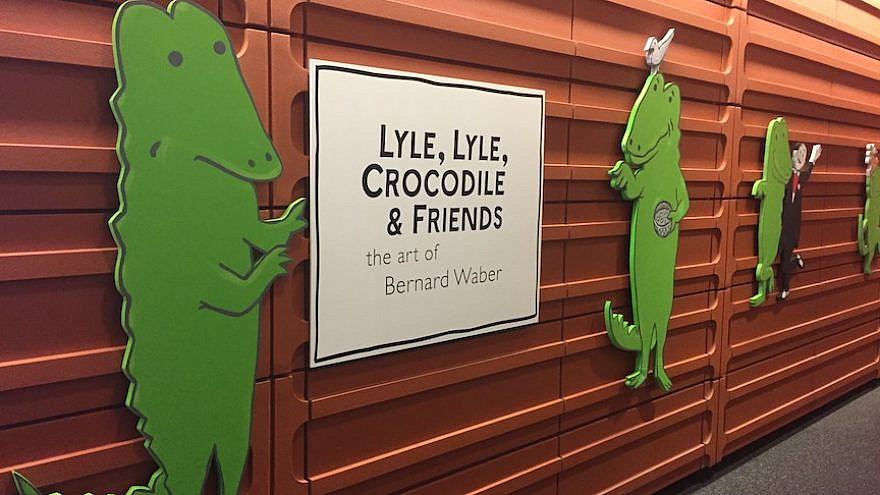Crocodiles are not kosher. But the much-beloved protagonist—initially misunderstood as a villain—of Bernard Waber’s children’s books “The House on East 88th Street” and “Lyle, Lyle, Crocodile” is arguably Jewish.
Waber, who wrote and illustrated the books in the 1960s, had a strong Jewish identity and, as the 2015 exhibit “Lyle, Lyle, Crocodile and Friends: The Art of Bernard Waber” at Philadelphia’s National Museum of American Jewish History suggested, the persecuted croc has a Jewish identity.
Josh Perelman, chief curator and director of exhibitions and interpretation at the Philadelphia institution, whose name has since become the Weitzman National Museum of American Jewish History, has not seen the new movie. But he told JNS that the literature upon which the show is based is “subtle in its Jewishness.”
“The plot is about the embrace of difference—after initially fearing the crocodile they found in their bathtub, the Pimms embrace Lyle as a family member,” he said. “This could be applied to any number of social or interpersonal situations, but as the child of Jewish immigrants, Waber was quite familiar with the challenges of becoming American.”
“Lyle, as a character, can be appreciated and understood by anyone who has felt different, misunderstood or even hated—all experiences that are elemental to Jewish history and identity,” he said.
Waber, who died in 2013, came from a “strongly Jewish family,” and his immigrant parents spoke Yiddish at home, according to Perelman. One of his brothers founded Philadelphia’s Germantown Jewish Centre.
“We might say that Lyle, as a character, has a Jewish soul,” Perelman said.
Before creating the Lyle books, Waber would sketch crocodiles at the Philadelphia zoo, the exhibition revealed. An obituary in the The New York Times, citing Houghton Mifflin Harcourt, reported that Waber’s 33 books sold more than 1.75 million copies. His books also inspired an animated HBO musical and a theatrical stage performance.
The word “Jew” does not appear in the obituary, which notes only that Waber’s father, Henry, emigrated from Austria and his mother, Pauline, was born in Russia.
Waber was able to “truly see into the hearts of children, and to communicate their needs and wishes through the unlikely prism of a brownstone-dwelling crocodile,” wrote Jordana Horn in 2013 in Kveller.
“Waber’s talent lay in the way he conveyed important lessons about empathy, love and goodness in a way that comes across as genuine rather than preachy,” she added. “Today’s moralistic kid books, in comparison, mostly have the subtlety of a sledgehammer.”
In the 2022 film, which Josh Gordon and Will Speck directed, Javier Bardem plays a colorful, eccentric Hector P. Valenti, “star of stage and screen,” and the Primm family consists of the nervous loner Josh (Winslow Fegley), his uptight step-mom (Constance Wu) and relaxed, if not lackadaisical, father (Scoot McNairy). Shawn Mendes voices a decidedly un-reptilian-sounding Lyle, and Brett Gelman plays a particularly vindictive Mr. Grumps.
Nowhere is a menorah to be seen on a shelf, nor do Yiddish phrases drop in conversations, despite broad show business themes.
The Weitzman museum has often explored Jewish themes in children’s books—including immigration, social justice and negotiating difference—in “Lyle” and in Ezra Jack Keats’ “The Snowy Day.”
“The magic of children’s literature is its deceiving simplicity,” Perelman said. “Authors from minority communities, past and present, have woven their stories into their writing both to address their own specific stories and to offer families of all backgrounds opportunities to connect to, empathize with and explore our shared experiences.”


























